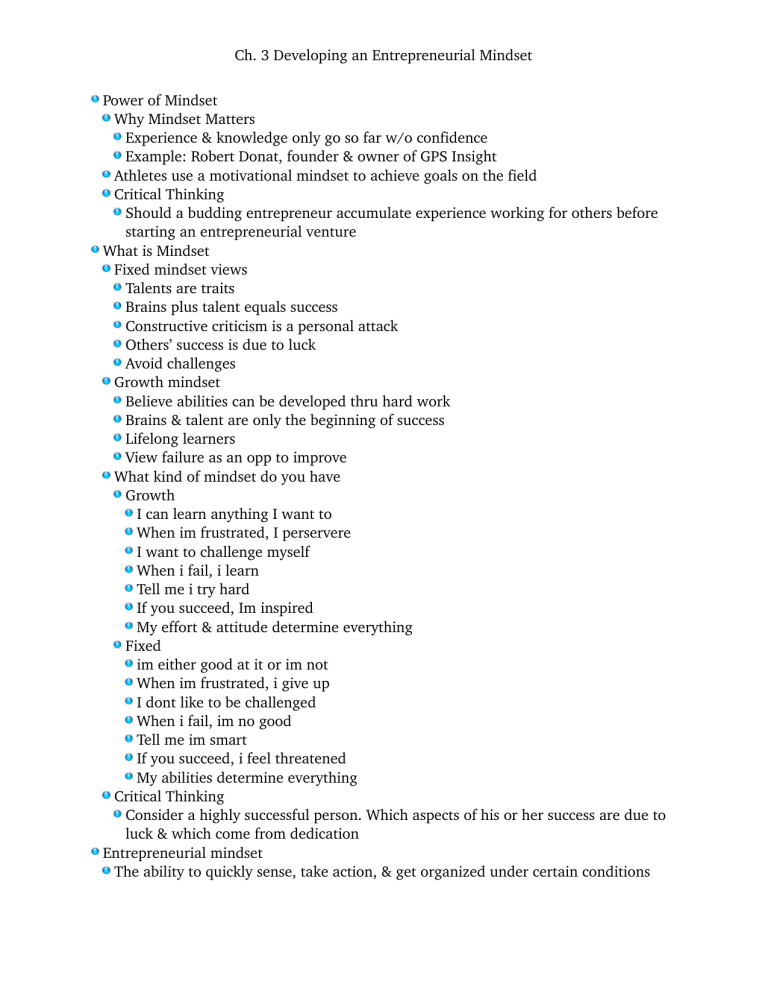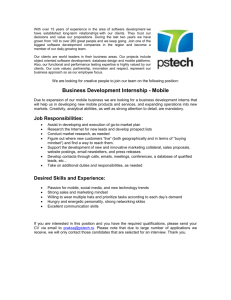Entrepreneurial Mindset: Development & Strategies
advertisement

Ch. 3 Developing an Entrepreneurial Mindset Power of Mindset Why Mindset Matters Experience & knowledge only go so far w/o confidence Example: Robert Donat, founder & owner of GPS Insight Athletes use a motivational mindset to achieve goals on the field Critical Thinking Should a budding entrepreneur accumulate experience working for others before starting an entrepreneurial venture What is Mindset Fixed mindset views Talents are traits Brains plus talent equals success Constructive criticism is a personal attack Others’ success is due to luck Avoid challenges Growth mindset Believe abilities can be developed thru hard work Brains & talent are only the beginning of success Lifelong learners View failure as an opp to improve What kind of mindset do you have Growth I can learn anything I want to When im frustrated, I perservere I want to challenge myself When i fail, i learn Tell me i try hard If you succeed, Im inspired My effort & attitude determine everything Fixed im either good at it or im not When im frustrated, i give up I dont like to be challenged When i fail, im no good Tell me im smart If you succeed, i feel threatened My abilities determine everything Critical Thinking Consider a highly successful person. Which aspects of his or her success are due to luck & which come from dedication Entrepreneurial mindset The ability to quickly sense, take action, & get organized under certain conditions Ch. 3 Developing an Entrepreneurial Mindset Includes the ability to persevere, accept & learn from failure, & get comfortable w/a certain level of discomfort Metacognition What is my goal How motivated am I What do I already know about this How much time will it take What strategy works best Passion Intense positive emotion Motivates to overcome obstacles Stimulates focus on goals Enhances creativity Critical Thinking How do your passion relate to your desired impact Entrepreneurship as a Habit Develop a mindset thru creating a habit Practice until it is carried out unconsciously & continually Entrepreneurs are more likely to continue when rewarded Critical Thinking What challenges do you foresee in developing the habit of entrepreneurship? How can you overcome these challenges The Self-Leadership Habit Self Leadership Individuals must influence & control their own behavior, actions, & thinking to achieve the self-direction, & thinking to achieve the self-direction & self-motivation necessary to build their entrepreneurial business ventures 3 strategies for self-leadership Behavior focused strategies Self-awareness Self-observation Self goal setting Self reward Self punishment Self cueing Natural reward strategies Making aspects of a task more enjoyable by building in ft to focus on the most positive aspects of the tasks Constructive though pattern strategies Forming productive ways of thinking that can benefit out performance How to practice: identify & reframe destructive beliefs by practicing positive selftalk & mental imagery The Creativity Habit Ch. 3 Developing an Entrepreneurial Mindset Developing creativity Creativity: the capacity to produce new ideas, insights, inventions, products or artistic objects, which are considered to be unique, & of value to others Roadblocks to Creativity Fear No appetite for chaos Preference for judging over generating ideas Dislike for incubating ideas Perceived lack of challenges Inability to distinguish reality from fantasy A Creative Mind Req both left brain & right brain thinking Both sides of Csikzentmihalyi’s Polarity of Creative Individuals model Left v Right Brain Orientation Left Brain thinking Detail oriented Forms strategies logic rational analytical verbal quant. processing talking writing objective linear directive words language reasoning Right Brain thinking big-picture oriented presents possibilities intuition emotional synthesizing spatial nonverbal processing drawing manipulating objects subjective creative experiential Ch. 3 Developing an Entrepreneurial Mindset symbols images dreaming The improvisation Habit Improvisation: art of spontaneously creating something w/o prep Improvisation Guidelines not just for actors & musicians no such thing as being wrong no questioning or rejecting suggestions ideas are taken on board, expanded, & passed on for further input everything is important it is a group activity trust that the group will solve problem listen closely & accept what you are given be spontaneous & imaginative Improv yes & principle anyone can improvise The Mindset as the Pathway to Action Self-efficacy & entrepreneurial intentions Entrepreneurial self-efficacy (ESE) - belief in own ability to begin new ventures ESE can be measured Self efficacy can change over time Role of Mindset in Opp Recognition As we adopt a more growth-oriented mindset, we are more inclined to recognize & create opp.



